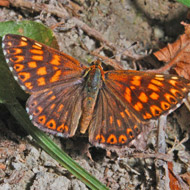
Over 100 species in England could be saved from extinction
England's most threatened animals and plants could be saved from extinction thanks to a new £4.6 million grant from the Heritage Lottery Fund (HLF).
The money will provide initial funding for a partnership project entitled 'Back from the Brink' - a programme that brings together a range of conservation organisations to focus on protecting key threatened species from extinction - such as the grey long-eared bat and the Duke of Burgundy butterfly.
The project in being run by Natural England and the Partnership for species Conservation - a coalition of seven of the UK's leading wildlife charities. By working together at sites across England, 'Back from the Brink' will save 20 species from extinction and help another 118 species that are under threat move to a more certain future.
Commenting on the announcement Melanie Hughes, Natural England’s director of innovation and reform, said: “It’s fantastic that we’ve been able to secure this funding to support the recovery of some of our most threatened species – something we believe will make a real difference to our environment and heritage.
“This is a great example of conservation organisations coming together; coordinating our efforts and combining our expertise to protect England’s most important wildlife.
“We know that people care about the fate of our endangered wildlife, and this programme focuses on inspiring local communities to enjoy and learn about the vulnerable species local to them and across England, and how they can take positive action to improve their habitats."
Once the development stage is completed in September 2016, the partnership hopes to secure the next phase of funding from HLF, which would mean the project would be up and running for four years until 2020.
Image (C) Hectonichus/Wikimedia Commons



 The latest
The latest